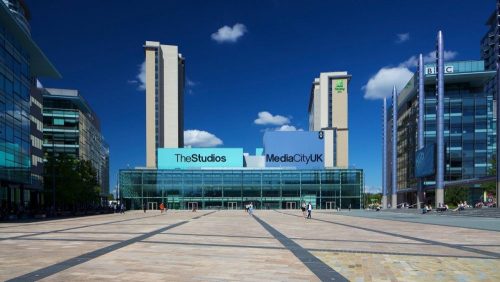Situated to the eastern point of the Manchester Ship Canal is Salford Quays, the site of the former Manchester Docks. It’s here where the city of Manchester underwent one of the biggest urban regeneration projects in the UK, breathing new life into what was a key industrial area of the city prior to the closure of Manchester’s dockyards in 1982.
Although there was a vision for embarking on a new development on Salford Quays, in the early stages, few would have predicted that it would become such a vibrant digital hub for many of the UK’s biggest media outlets. The first phase of the MediaCity centre was developed and overseen by Peel Media, in conjunction with the University of Salford, as a means of becoming a hub for digital media and innovation.
The BBC had already mooted moving some of its London-based operations to Manchester in a bid to cut operational costs without impacting its service output. Media City was eventually selected as the most suitable location, with the BBC’s arrival designed to help Media City compete on the global stage with other media hubs in Singapore and Copenhagen.
Five years after the BBC made the decision to move at least 1,800 jobs from London to Manchester, the proposals eventually came to fruition in 2011. It was a move fraught with danger at the time, given that much of MediaCity was still a building site. However, the BBC believed in the move and the concept of MediaCity, with its potential to offer greater support to the north of England’s independent production and media industry.
The BBC’s switch to MediaCity was fully complete by April 2012, with the corporation successfully staying within its £223m budget. The arrival of the BBC was the catalyst MediaCity needed to make a real impact on Manchester’s economy and that of the wider North West. In the first five years of the BBC’s presence in MediaCity, job creation soared by over 2,000.
In terms of MediaCity’s impact on the national economy, KPMG estimated that it had delivered £277m in Gross Value Added (GVA) in just 12 months alone (2016). KPMG also forecasts an additional 1,700 creative jobs in Salford by 2034. MediaCityUK has not only become a beacon of innovation in Salford but the entirety of Greater Manchester. In 2017, it was revealed that the city’s media industry had soared to a net worth of £3.1bn, which was twice as much as its value in 2010.
It’s not just the BBC that exists in MediaCityUK either. Many other major brands have positioned themselves here at the coalface of 21st-century digital media, including Ericsson and Kellogg’s. There’s also a raft of independent digital agencies collaborating in the area, creating arguably Europe’s most vibrant media hub.
Manchester is now considered one of the best cities in the UK for start-ups. If you want to position your new or growing business on the cusp of MediaCityUK, Pall Mall Estates can help. We own and manage 5.5 million square feet of commercial space across the UK, including premises throughout Greater Manchester.
—
Pall Mall Estates have a wide range of low cost commercial properties across the UK.
Take a look at our available spaces here or get in touch with our experienced team here.
—
Pall Mall Estates have a wide range of low cost commercial properties across the UK.
Take a look at our available spaces here or get in touch with our experienced team here.







